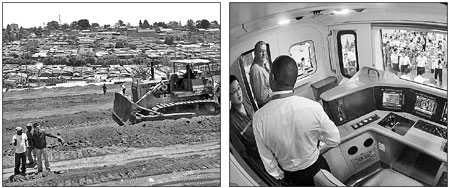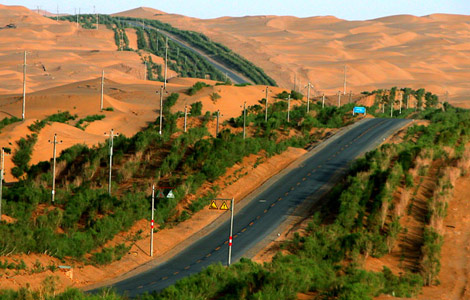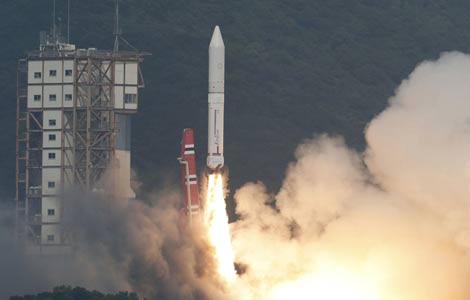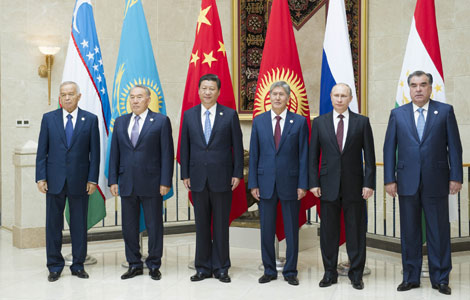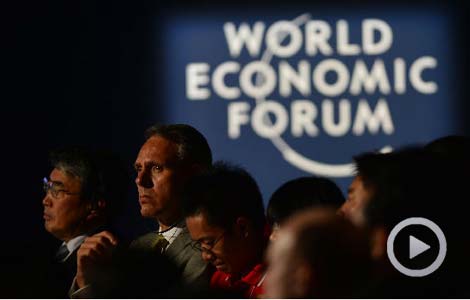New Frontiers ripe for exploitation
Updated: 2013-09-16 08:16
By Bao Chang in Beijing (China Daily)
|
||||||||
Enterprises that are State-owned are paving the way for sustainable African development
Zipping through the still-not complete modern expressways that make up the Congo National No 1 Road between Brazzaville, the capital of the Republic of Congo and the port city of Pointe-Noire, it is hard to believe that a Chinese State-owned firm has played a key role in resurrecting what was once a broken-down, abandoned and important transport lifeline in Africa.
Elsewhere in Africa, there is a buzz of activity at the various Special Economic Zones set up by Chinese SOEs in Zambia, Mauritius, Egypt, Ethiopia, Nigeria and Algeria. In Botswana, and Ghana construction projects developed by Chinese SOEs are making a difference by providing more jobs to local communities.
Juxtapose this with the bloated often flabby image of Chinese SOEs and the general perception is that they are behemoths who stifle competition, use up natural resources and hence are a drag on economic growth. The real picture that emerges from Africa, however, is of a new growth model, or rather a success story, built more on sustainable development, community transformation and profits.
"Chinese SOEs have played a key role in the sustainable development of resources in Africa. Through their efforts, the SOEs have been able to make great inroads into the local market and to other developed markets through re-exports," says Shi Yongxiang, a Beijing -based corporate management expert.

Although they are often called China's new pillars of outbound investment, SOEs have also faced flak for pursuing a self-centered agenda, rather than national goals, in overseas markets. But with competent, cost-effective and speedy execution of big-ticket projects in Africa, Chinese SOEs have proved that profits and development can go hand-in-hand.
Speedy and timely executions of big infrastructure projects, along with adequate capital and resources to work even in hostile conditions have been the mainstay of Chinese SOEs in Africa, experts say.
Overseas assets of Chinese companies, running to more than 15,000 units worldwide, are estimated to be worth about $1 trillion and more than half of this comes from SOEs, according to data provided by the State-owned Assets Supervision and Administration Commission.
Liu Nanchang, director of the Performance Evaluation Bureau of the State-owned organization, says that Chinese SOEs will scale up their overseas presence substantially in the next decade. "During the next five to 10 years, we will see SOEs deploying more resources in overseas markets, especially Africa."
Investigations show that the return on investment in Africa is a high 36 percent, compared with 16 and 14 percent in Asia and global markets.
"SOEs find Africa appealing because of the complementary nature of its energy, agriculture and construction sectors," management expert Shi says.
Over the past decade, China's investment in Africa has risen steadily, from $75 million in 2003 to $2.9 billion by 2012. By the end of last year, cumulative investments from China to Africa had reached $19.2 billion, involving more than 2,000 Chinese companies and 51 countries and regions in the continent.
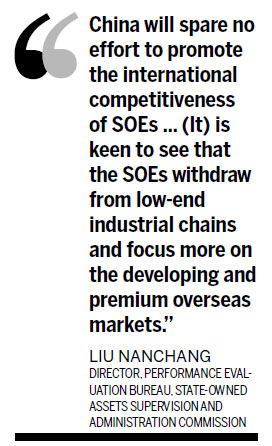
To understand the real impact of Chinese SOEs in Africa, one need only look at the massive road construction project near Mayombe in the Republic of Congo.
Mayombe, a huge virgin forest with more than 300 kinds of plants, is also right in the middle of what was once an important transport network in central Africa. The abandoned, crumbling 580 kilometer road network between Brazzaville and Pointe-Noire received a new lease of life after the State-owned China State Construction Engineering Corp undertook a massive reconstruction project in 2008.
Once construction is completed, the road is expected to benefit more than 65 percent of the Republic of Congo's population of 4.2 million. The 164 km first phase of the project was completed and opened to traffic in October 2011.
"Although a fully-functioning road was a dream for the Congolese people, it was a tough challenge for us. The old road was out of repair for several years and many parts had been submerged under forest growth and rainwater," says Li Jiqin, general manager of the overseas department at the CSCEC.
"Getting through the Mayombe forest was a formidable challenge for us because we had to battle tropical diseases, such as malaria, typhotoxin, filariasis and dengue fever and also worms, snakes and other dangerous animals," he says.
We were undaunted and decided to forge ahead, rather than give up, Li says, adding that the motto in those days was, "Go forward, go forward. Chinese people are making history in Mayombe."
The second phase of the project is now under way. The CSCEC plans to hire more local people in an effort to provide more job opportunities and boost local residents' salaries, company officials say. The first phase provided jobs to 4,000 locals, while the second phase has provided jobs to more than 3,000, they say.
Other Chinese SOEs have also been expanding and making more direct investments in Africa.
China Jiangxi Corp for International Economic & Technical Cooperation is another Chinese SOE that is seeking to diversify its international operations by investing more in building materials and solar-power industries.
The company has established production plants and construction bases in several African countries, says General Manager Xu Guojian. China Jiangxi has invested more than $6 million in overseas projects, such as metal factories and asphalt-mixing plants, in Botswana, Zambia and Ghana.
"These factories (in Africa) have ensured that we have adequate supplies of construction materials and also lowered total construction costs," Xu says.
Chi Jianxin, president of the China-Africa Development Fund, an investment fund focused on Africa, says that SOEs have played a big role in bilateral cooperation with Africa and in sustainable development. Investing in Africa, according to Chi, is also an avenue for Chinese companies to showcase their technology prowess, management skills and expertise in handling complex projects.
According to a report published by global law firm Freshfields Bruckhaus Deringer, China has become the world's third-largest country undertaking mergers and acquisitions in Africa, especially in the oil and gas sector. China has so far conducted 49 M&A deals totaling $20.8 billion in Africa since 2003, following the United Kingdom with $30.5 billion and France with $30.47 billion.
"China will spare no effort to promote the international competitiveness of SOEs. In addition, the government is keen to see that the SOEs withdraw from low-end industrial chains and focus more on the developing and premium overseas markets," Liu from SASAC says.
In addition, Africa is estimated to become China's largest trade partner within the next three to five years. Trade between China and Africa is expected to jump by 20 percent this year, while investment will grow at an even faster pace, according to Wei Jianguo, secretary-general of the China Center for International Economic Exchanges, a government think tank.
Last year, China's trade with Africa reached $200 billion, with Chinese exports increasing 16.7 percent year-on-year to $85.3 billion, while imports grew 21.4 percent to $113.1 billion.
Boosted by its fast economic growth, Africa's demand for Chinese products has also been booming. China South Locomotive and Rolling Stock Co Ltd, one of the country's two leading train manufacturers, is speeding up work on producing and exporting $400 million worth of electric locomotives to South African Transnet SOC Ltd, a large rail, port and pipeline company in that country.
The deal also marks the first time that Chinese electric trains have been introduced in the African market, and was the biggest order for equipment of this sort that a Chinese train maker has ever won in overseas markets.
"Considering this new opportunity in the African market, CSR will push forward its rail transportation equipment business and broaden its cooperation with other local companies in Africa," says Xu Zongxiang, general manager of CSR Zhuzhou Electric Locomotive Co Ltd.
CSR officials indicated that apart from product exports, the first batch of which will be delivered by the end of this year, the company will also provide technology used in the manufacture of electric locomotives to South Africa. The promotion of technology in China's train-manufacturing industry has received a large amount of recognition internationally.
According to experts, although support from the government has helped Chinese SOEs in Africa, they will need to establish more successful local partnerships through M&A deals with African firms.
"We are looking for suitable M&A deals in Africa and other regions," says Li Jiqin from the CSCEC.
Protecting the environment is another area where Chinese SOEs are making a difference. China National Petroleum Corporation has built the world's largest biodegradable wastewater treatment facility in Sudan to eliminate the discharge of toxic effluents. This is another example of sustainable development, experts say.
The International Moneary Fund forecasts that, among the top 10 countries with the fastest growth in GDP from 2011 to 2015, seven will be in Africa. In 2011, the average growth of GDP in the continent was 5.4 percent. The figure was expected to reach 6.1 percent in 2012, the IMF report said.
During his visit to Africa earlier this year, President Xi Jinping reaffirmed China's commitment to broaden and expand its ties with Africa. With a prospering economy and new efforts made in seeking strength from unity, Africa has achieved growing international standing. At the same time it also faces many challenges, Xi said during his visit.
"I am confident that, so long as Africa maintains peace and stability, and actively explores a development path that suits its own conditions, it will undoubtedly embrace a brighter future," Xi said, adding that Sino-Africa ties have several opportunities for development.
Last year, Africa also emerged as a popular travel destination for Chinese tourists. According to the China National Tourism Administration, China has become South Africa's fourth-largest tourist source market. Experts estimate that the growing Chinese tourist numbers will give a boost to industrial development on the continent.
baochang@chinadaily.com.cn
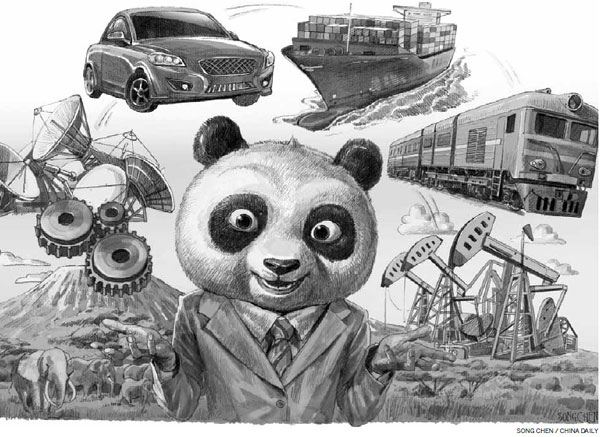
|
Left: A construction site of China Road & Bridge Corporation in Nairobi. Right: The first electric train exported to Africa came off the production line at China South Locomotive and Rolling Stock Co last month. Ding Haitao / Xinhua |
(China Daily USA 09/16/2013 page15)
Most Viewed
Editor's Picks

|

|

|

|

|

|
Today's Top News
USDA's OK of chicken processing challenged
US top carpet maker sets up in China
States laud lifting of ban on hardwood by China
UN chief gets report on Syria chemical weapons
Succession proves a tricky art in business
Going global? Not so easy
Japan switches off nuclear reactor
Summers withdraws from Fed chair contest
US Weekly

|

|
